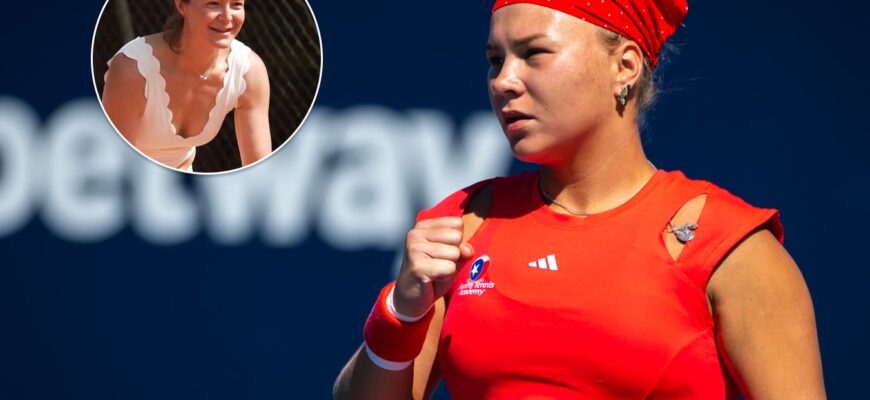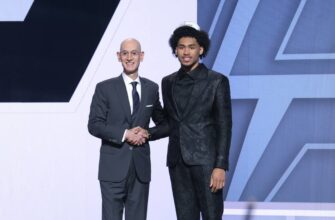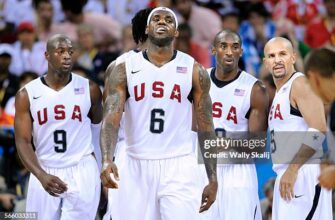MADRID — Dinara Safina, the former Hologic WTA Tour World No. 1, knows firsthand that playing is significantly easier than watching. Despite this, she recently decided to return to elite tennis, taking on a coaching position.
Safina might have been questioning that decision on Friday in Madrid as Diana Shnaider and her partner Mirra Andreeva battled it out on Court 5 at the Mutua Madrid Open. Ultimately, they managed to overcome Nicole Melichar-Martinez and Liudmila Samsonova in a tense 12-10 match-tiebreak.
Witnessing Safina`s contorted expressions and nervous energy from her seat was telling. Was she on the verge of a heart attack?
“Almost,” she admitted with a shake of her head.
Shnaider echoed her sentiment, saying, “I can imagine that. I almost had one, too.”
Safina, renowned as one of the top clay-court players of her era, is back on the familiar red surface, now working with Shnaider, who celebrated her 21st birthday earlier this month. Shnaider is currently ranked No. 13 and delivered a dominant 6-0, 6-0 victory over Anastasija Sevastova in just 44 minutes on Saturday.
This was Shnaider`s first flawless victory (a “shutout”) at the WTA Tour level, propelling her into a Monday Round of 16 match against either World No. 2 Iga Swiatek or World No. 31 Linda Noskova.
So, how did Safina and Shnaider join forces?
Shnaider was coached by Igor Andreev until the close of last season, after which her father, Maxim, a lawyer, stepped in temporarily. When Shnaider began her search for a new coach this year, her mother, Yulia, reached out to 2004 French Open champion Anastasia Myskina for recommendations. Myskina, a close friend and colleague of Safina`s, who talks to her almost daily, suggested Safina. Shortly after, Yulia texted Safina.
“They asked me if I could come to Dubai, and I told them it was too soon, I couldn’t change my plans,” Safina explained. “Then, for the U.S. tournaments, I didn`t have a visa. So I said, ‘OK, I’m available for the clay-court season.’
“I discussed it with my family. For me, it felt like the perfect timing.”
Shnaider shared that she is enjoying their practice sessions and spending time together. She believes Safina’s most valuable contribution comes from her extensive experience as a top player.
“A lot about mental strength, concentrating on the right things,” Shnaider commented. “How to manage emotions more effectively. It’s about subtle adjustments, like better placement of the ball on the court. Stepping in to play more aggressively. Capitalizing on opportunities, moving forward, approaching the net.
“Mainly, it`s about not letting negative emotions drag me down. If I make a mistake, not dwelling on it. Figuring out what went wrong, finding a solution, and staying focused on the next point. Not being too hard on myself.”
Safina finds it interesting to experience tennis from a coaching perspective.
“I’m not sure if it helps her or not – it seems like sometimes it does, sometimes it doesn’t,” Safina mused. “Sometimes she pays attention, sometimes she doesn’t.”
When a reporter noted Shnaider is only 21 and in her third season on tour, Safina responded directly.
“She’s not a child, come on,” Safina stated. “We need to be realistic. She’s an adult now. Gradually, she needs to mature and become a woman, becoming a little more disciplined.”
Shnaider doesn`t dispute this.
“I always listen to her, it just sometimes takes time to implement what she asks,” Shnaider said. “I’m never dismissive about it.”
“I understand what she wants, but sometimes it’s just a bit challenging. It’s not like a simple click where you can instantly change yourself.”
Safina retired from tennis in 2011 at the relatively young age of 25 due to a persistent back injury.
What has she been doing since?
“Honestly,” she sighed, “just living life.”
In the 14 years that have passed, Safina has pursued a diverse range of experiences. She returned to university and earned a law degree. She worked in player relations for tournaments in Madrid, Moscow, and St. Petersburg, and even served as an operations director for an IT company. The latter role required standard office hours, which didn`t suit her. She also spent time living in New York City and coached Anhelina Kalinina.
Her most significant personal challenge for nearly a decade was a struggle for self-control.
“I went through a lot – I never really talked about it openly,” Safina revealed. “I gained a lot of weight and struggled with a binge eating disorder. It affected me for quite a long time.”
“There were ups and downs. Periods of depression, battling with it. I felt lost. Slowly, I began to find my way out.”
That turning point was in 2020.
“And now I’m here,” Safina added with a smile.
Just a month ago, she and her brother, Marat, were primarily known as the only brother-sister duo in tennis history to reach the World No. 1 ranking on their respective tours. Today, both are coaching Top 15 players; Marat recently joined Andrey Rublev’s team.
A notable parallel: both the player and the coach have won an Olympic silver medal – Shnaider in doubles with Mirra Andreeva last summer in Paris, and Safina in singles at the 2008 Beijing Olympics.
Their current agreement with Shnaider is set to run through the clay season. They plan to discuss the future after Roland Garros.
“We’ll see,” Safina commented. “It’s something we still need to discuss.”
Shnaider sounds quite optimistic about the partnership.
“I really like how things are going so far,” she said. “How she understands my game. What she wants me to work on and improve.”
“By the end of – or perhaps before – Roland Garros, we’ll sit down and talk, maybe come to an agreement, share our thoughts with each other. For now, I’m just enjoying it, and I hope she is, too.”







